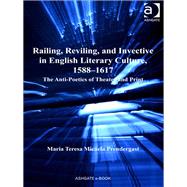Railing, Reviling, and Invective in English Literary Culture, 1588û1617: The Anti-Poetics of Theater and Print
, by Prendergast,Maria Teresa Micae- ISBN: 9781409438090 | 1409438090
- Cover: Hardcover
- Copyright: 6/21/2012
Railing, Reviling, and Invective in English Literary Culture, 15881617 is the first book to consider railing plays and pamphlets as participating in a coherent literary movement that dominated much of the English literary landscape during the late Elizabethan/early Jacobean period. Author Prendergast considers how these crisis-ridden texts on religious, gender, and aesthetic controversies were encouraged and supported by the emergence of the professional theater and print pamphlets. She argues that railing texts by Shakespeare, Nashe, Jonson, Jane Anger and others became sites for articulating anxious emotionsincluding fears about the stability of England after the death of Queen Elizabeth and the increasing factional splits between Protestant groups. But, given that railings about religious and political matters often led to censorship or even death, most railing writers chose to circumvent such possible repercussions by railing against unconventional gender identity, perverse sexual proclivities, and controversial aesthetics. In the process, Prendergast argues, railers shaped an anti-aesthetics that was itself dependent on the very expressions of perverse gender and sexuality that they discursively condemned, an aesthetics that created a conceptual third space in which bitter enemiesmale or female, conformist or nonconformistcould bond by engaging in collaborative experiments with dialogical invective. By considering a literary mode of articulation that vehemently counters dominant literary discourse, this book changes the way that we look at late Elizabethan and early Jacobean literature, as it associates works that have been studied in isolation from each other with a larger, coherent literary movement.







